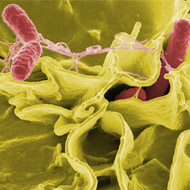
Study finds that more than 60 per cent of infectious diseases arise from animals
The number of infectious disease outbreaks and the number of unique illnesses causing them appears to be increasing, a study by Brown University has revealed.
Researchers analysed more than 12,000 outbreaks affecting 44 million people across the world over the last 33 years. The raw numbers revealed a steep rise in the number of outbreaks globally.
Between 1980 and 1985 there were less that 1,000 outbreaks of disease, but for the period of 2005 to 2012, the number rose to almost 3,000. In the same time, the number of unique disease causing the outbreaks surged from less than 140 to about 160.
The analysis also revealed that 65 per cent of diseases in the dataset were "zoonoses," meaning that they come from animals.
Katherine Smith, assistant professor of biology and co-author of the study, said: "We live in a world where human populations are increasingly interconnected with one another and with animals - both wildlife and livestock - that host novel pathogens. These connections create opportunities for pathogens to switch hats, cross borders, and evolve new strains that are stronger the what we have seen in the past."
From the analysis, they researchers compiled top 10 lists for each decade of diseases causing the most outbreaks. For zoonoses in 2000-10, salmonella topped the list, followed by e-coli, influenza A, hepatitis A, anthrax, dengue fever, shigellosis, tuberculosis, chikingunya, and trichinosis.
Katherine said that it is good news that although the world seems to face an increasing number of infectious flare ups, we are improving our public health and medical defences too.
Katherine wrote: "Our data suggests that, despite an increase in overall outbreaks, global improvements in prevention, early detection, control and treatment are becoming more effective at reducing the number of people infected."
The paper, Global rise in human infectious disease outbreaks, is published in The Journal of the Royal Society Interface.
Image (C) National Institutes of Health



 The Animal and Plant Health Agency (APHA) has updated its online reporting service for dead wild birds.
The Animal and Plant Health Agency (APHA) has updated its online reporting service for dead wild birds.